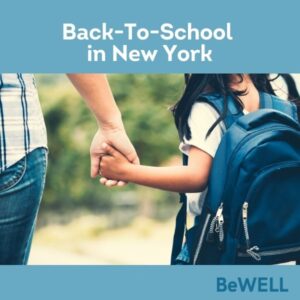For a little over a month in New Jersey, students have been back to school for in-person learning. For the first time in over a year, our kids have filled hallways, school busses, and classrooms for in-person schooling, after Zoom classrooms and virtual education. This change marks what many had hoped would be a return to “normal” life, but a lot of families are experiencing heightened anxiety symptoms and feelings of uncertainty surrounding a return to in-person school. You and your child may have been ready to get back to collaborative face-to-face learning and team sports, but this change hasn’t necessarily been easy for all children, and it certainly hasn’t been seamless for all parents.
Back-to-school jitters are often common among children, especially when they are transitioning to upper school, entering into new social settings, or have undergone obvious developmental and physical changes. Summer vacation is often long enough to give adolescents and younger students social anxiety or feelings of uneasiness while reacclimating to school life, however after more than a year of solo schooling and virtual learning because of Covid 19, many children are facing new and unique challenges. Social isolation, internalizing stress at home, and too much screen time are just some of the unique challenges children may be facing post pandemic as they go back-to-school. If you or your child are feeling anxious or uneasy with the transition back to in-person school, you are not alone and a be.Well therapist may be able to help.
What You Should Look For in Your Child
If you are a parent sending your children back to school this fall, you may already be feeling the stress. With the delta variant still posing a very real threat, mask mandates, and vaccine requirements, your child may be feeling more uncertainty and anxiety than is manageable for them. In addition to the fear of the unknown that covid brings, your child may also be dealing with increased academic and social stress, especially after being out of school for so long. Things like sharing space, working collaboratively face-to-face, and sharing and talking openly may be overwhelming and quite difficult.
According to Sarabjit Singh, executive medical director of behavioral health services at three New Jersey hospitals, here are some signs to look for in your child, that may indicate increased anxiety or other mental health struggles:
- A change in your child’s behavior
Anything from a change in sleep or a change in eating habits could indicate anxiety or other mental health struggles. It may seem completely unrelated to school or stress, but big changes in your child’s normal behavior is often a nonverbal warning sign that they may be struggling to cope or adapt to environmental changes.
- Tummy aches, headaches, or other physical symptoms in younger children
Small children tend to project the feelings they cannot put into words onto others or have physical symptoms. Look out for physical ailments as a sign of stress or feeling overwhelmed.
- School refusal or social refusal
When your child simply refuses to go to school or engage in social interactions that they used to enjoy, like sports or after school activities it may be because of fear, anxiety, or indicate depression. Acting out or rule breaking is also a behavior to look out for.
What You Can Do if Your Child has Back-to-School Covid Anxiety
It is important to remember that parents, their behavior, and the way they talk about their own feelings of stress can help children cope with their own heightened feelings of anxiety or back-to-school stress. Children are far more aware than many parents would like to believe, and they are always watching, listening, and picking up on their parent’s behaviors. Displaying healthy communication and coping skills will in turn teach children healthier ways to manage their own stress, in the home and at school.
Singh reminds parents that modeling healthy behavior at home is key for children. For example, Instead of pouring a glass of wine after a long day, take a walk with your children. Taking walks together after a hard day at school or work, is a great way to bond, blow off steam, and increase feel good chemicals. This time will also give parents the opportunity to check in with their children, another crucial element to helping students ease back-to-school anxiety.
It is critical for parents to talk openly with their children in order to create an environment where children feel safe discussing their feelings, expressing their fears, and asking for help if they are feeling overwhelmed. Parents may need to find new and different ways to check in and communicate with their kids, as not all children will be willing or able to openly communicate and articulate their feelings. Parents may need to offer more hands-on support than they had pre-pandemic both academically and socially. Things like setting up playdates for younger children may not have been something they needed in the past, but after such a long period of social isolation, children may need more guidance.
Structure and routine is more important than ever for children getting back into the swing of school life. Consistent dinner time, work time, and play time will help children decompress from the school day. Singh tells parents that setting clear rules and boundaries at home will allow children to better cope with the inconsistencies happening in the world around them.
NJ Vaccine Mandate for School Employees and Educators
According to NJ.gov by October 18th, all full-time and part-time employees of public, private, and parochial schools up to grade 12 will be required to be fully vaccinated, or subject to up to 2 tests per week in New Jersey. Indoor face coverings are required while in doors in all schools and New Jersey is also recommending students, who are of age, also get vaccinated. While this may offer some peace of mind to some teachers, parents, and students, this may increase feelings of uneasiness in others. Talking to your children about the Covid rule and regulations openly allows them to process the ever-changing information. Ask your children how they feel about the rules, and encourage them to ask questions in order to make sense of their experiences. Urge your children to practice safety and allow them to do what they feel comfortable with in school or social settings. Most importantly, give your children grace during this time, and encourage them to be gentle with themselves during this period.
If you or your child is struggling with back-to-school stress or anxiety in New Jersey, you are not alone and a Be.WELL. Therapist is here to help. Our Be.Well Therapists can help you or your child find ways to cope with anxiety and care for your overall mental well being.A Be.WELL. Therapist is available in both Midtown, NYC and Hoboken NJ.



